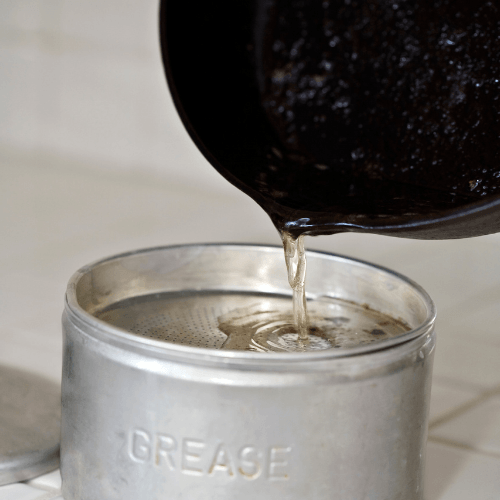Why You Should Never Pour Grease Down the Drain
Fatbergs Unearthed in the Bowels of Major American Cities!
Why You Should Never Pour Grease Down the Drain

FATBERG – First used in 2008 to describe "large, rock-like lumps of cooking fat" washing up on beaches in Wales. Fatberg” is a compound of the words “fat” and “iceberg.” Fatberg is now a recognized Oxford Dictionary word commonly used to reference sewer-blocking fat deposits.
FATS, OILS & GREASE – commonly referred to as FOG—are some of the trickiest things to treat in wastewater. Fats, oils and grease can build up and become “fatbergs”; masses of grease, oils and non-biodegradable waste that don't get washed away. Fatbergs can build up in local city and county tunnels and pipes, causing a big, solid, stinky mess – starting with your own home’s plumbing.
What problems are caused by grease?
- Potential contact with bacteria and viruses that can cause illnesses.
- Sewage backup into your home, clogged drains, clogged toilets. The sewage can even backup into your tub!
- Sewer overflow can damage neighborhoods homes, yards, streets, and play-spaces.
- Expensive cleanup, repair and replacement of damaged personal property.
- Budget-breaking higher operating and maintenance costs; local sewer bills could rise as a result.
We plumbers love to ‘dredge’ up facts (pun intended): In 2018 officials in in Macomb County, Michigan, spent $100,000 to remove a Fatberg in county sewer lines that was an astounding 100 feet long, 10 feet wide, and six feet tall – about the size of a Blue Whale. Completely solid, removing this fatberg was a dangerous, dirty and expensive job. Everyone pays when local sewer lines clog.
Fatbergs are becoming a massive problem worldwide due to improper disposal of FOG.
What can YOU do? And how can WE help? Paschall PLUS, has answers.
Home prevention and remedies
Prevention’s simple answer is to throw it in the trash; but follow these steps:
- Allow the oil to cool. Hot oil can melt your trash can liners. Messy!
- Pour cooled oils into a leak-proof disposable container and close tightly.
- Tip: save your ‘empties’ of non-recyclable bottles, cans, etc., to throw away grease
- Toss the sealed container into the trash bin.
- OR contact local waste management facilities to find out who collects cooking oil for recycling into Biodiesel Fuel.
- Recycle Finder is an online search engine to find where locally to drop off used oils.
- Never pour used oil on the ground. Kitchen grease damages dirt like petroleum oils.
- Minimally use your garbage disposal to help reduce blockages in kitchen sinks from food particles combining with grease in the pipes. Instead use a sink strainer to collect food waste and regularly throw strainer waste into the trash.
- Also, wipe oil-coated pans with a paper towel before washing. A large amount of FOG buildup in pipes comes from washing greasy dishes.
- Periodically pour boiling water down drains to help loosen and flush out pipes. Take extra caution when handling boiling water as serious burns can occur to family and pets.
- Boiling water is safer on pipes than potentially corrosive chemical drain cleaners; plus, these chemicals ultimately end up polluting our natural waterways.
Remedies for when a mini-Fatberg invades your home pipes:
Follow our prevention tips and it could be a good long time before you need us. But once a fatberg forms, it is very difficult to eliminate without our professional plumbing services. Call Paschall Plus. We really are your best remedy.
